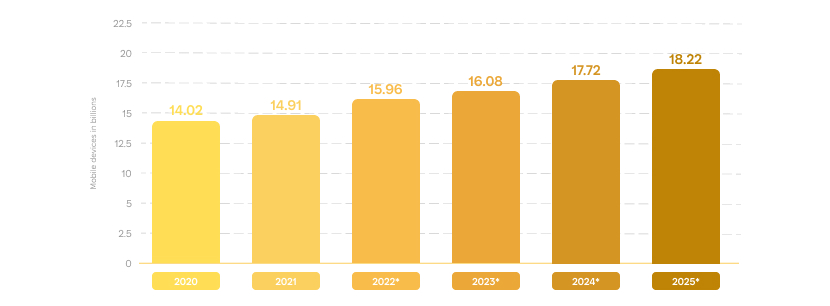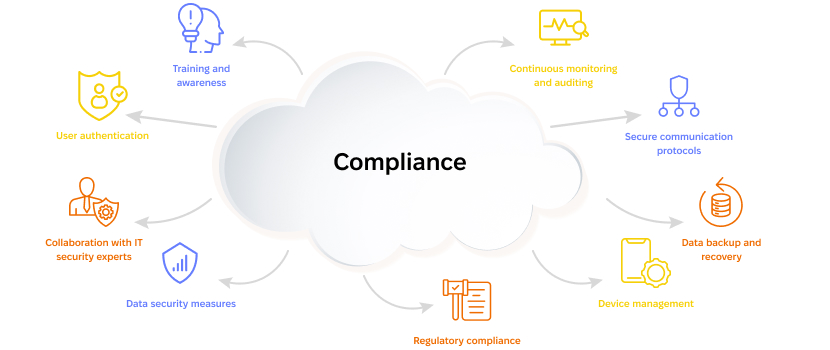Blog
Mobile technologies help logistics companies address operational inefficiencies, like lack of real-time visibility, slow delivery times, and decreased customer satisfaction. Our blog post explains the benefits of developing mobile apps for logistics, helping businesses streamline route optimization, inventory management, and vehicle tracking.
Mobile technologies have transformed the way we work and run businesses. No wonder mobile
solutions in logistics are pivotal for navigating increasingly complex supply chains and
soaring customer expectations. Logistics mobility is vital for companies to streamline
operations, enhance communication, and drive unprecedented efficiency and agility.
Exoft is a
logistics software development company
with 10+ years in the industry. We excel in crafting
custom mobile apps for logistics, focusing on fleet management, warehouse optimization, order handling, freight
forwarding, and asset tracking. Our numerous clients benefit from cost reduction, boosted
efficiency, scalability, and improved customer satisfaction.
In this blog post, we’ll explain why it’s high time for any logistics company to consider
custom mobile development
and outline the main advantages of going mobile for the transportation service provider.
Understanding the Impact of Mobile Apps on Logistics
According to Statista , there are more than 16 billion mobile phones worldwide and this number is forecast to grow to 18.22 billion by 2025. As a result, more and more businesses choose to develop a mobile application either for internal purposes or for customer usage and logistics companies just couldn’t stay aside from this huge mobility trend.

Advanced mobile device capabilities and expanded Internet coverage also play an important role in the growing popularity of logistics mobile app development . Nowadays, only a few areas in the world are not yet covered by 4G/LTE. The number of global 5G smartphone subscriptions reached 1.5 billion in 2023 and is set to exceed two billion by the end of the current year.

The impact of mobile solutions on logistics is immense. Smartphones, tablets, apps, and
the Internet of Things (IoT) enable rapid response to customer demands, reduce costs, and
provide real-time access to critical information. Unlike legacy systems, they seamlessly
integrate product information, enhancing managers' ability to make informed, real-time
decisions.
Mobile solutions for logistics, alongside the
modernization of technology, streamline stakeholder communication, reducing response times and improving coordination. They optimize route planning and tracking, improving resource utilization
and timely deliveries. Integrating mobile applications revolutionizes logistics by promoting
agility, transparency, and cost-effectiveness.
Logistics Sectors Where Mobile Apps are Most Popular

Logistics mobile solutions are highly favored in B2B settings, where efficiency and real-time data access are paramount. Across various sectors, transportation and logistics mobile apps are rapidly gaining traction, transforming traditional processes and enhancing operational agility.
Supply Chain
Mobile applications streamline processes, improve visibility, and enable rapid adaptation to changing supply chain dynamics. This ultimately increases competitiveness and operational excellence. Mobile logistics management software facilitates:
- seamless communication
- real-time supply chain visibility
- integration with ERP systems
- efficient inventory management
- order tracking
Adopting solutions like ERP applications, inventory management apps, and order tracking systems is growing significantly, enhancing supply chain efficiency. Mobile apps in logistics integrated with artificial intelligence and machine learning further boost supply chain efficiency and competitiveness.
Warehousing
A transport and logistics app can streamline inventory management, order fulfillment, and cycle counting processes in warehousing optimization. Integrated with a warehouse management system (WMS), these apps provide managers with enhanced control over storage spaces and goods, regardless of warehouse size. The function-set of a warehousing app may include:
- overview of the storage spaces
- tracking of goods
- planning and task assignment
- history of item transfers within a warehouse
In addition, a mobile app for warehouse workers may contain a built-in barcode or QR code scanner. By automating some routine tasks like picking and packaging, such a scanner will streamline the workflow and improve the worker’s productivity.
Transportation
Mobile solutions for logistics reshape transportation, optimizing route planning, shipment
tracking, and driver communication. The use of apps for transportation enhances efficiency
visibility in transportation operations.
There are many types of
transportation mobile apps. Most of them are aimed at facilitating effective fleet management and optimizing the
delivery process. For instance, a mobile
logistics management software
can:
- track vehicles and cargo
- collect real-time data on routes and deviations
- monitor fuel consumption
- send notifications on delays, etc.
On the other end, drivers may use a mobile application to have all the important information near at hand, instantly contact managers if some issues occur on the road, find nearest gas stations, track transportation time, mileage, and many more.
Last-Mile Delivery
Mobile app adoption is surging in the last-mile delivery segment due to increasing customer demands. These solutions enable:
- real-time tracking
- electronic proof of delivery
- enhanced customer communication
- streamlined delivery management
- dynamic route optimization
Businesses leverage delivery management apps, route optimization tools, and electronic proof of delivery (ePOD) solutions to boost customer satisfaction and operational efficiency in the final stages of the supply chain. A logistics app for transport companies can help maintain competitiveness and address the latest industry requirements.
Key Benefits of Mobile Applications for Logistics Businesses

Mobile applications drive efficiency, enhance visibility, and improve overall operations. Here are some key benefits of the logistics mobile app.
Enhanced Route Planning and Optimization
Mobile applications offer logistics businesses the capability to optimize route planning. They ensure efficient and timely deliveries while minimizing fuel consumption and reducing transportation costs.
Real-Time Tracking and Visibility
With mobile applications, logistics companies can track cargo and shipments in real-time, providing enhanced visibility throughout the supply chain. This feature facilitates better inventory management, reduces the risk of delays, and improves overall operational efficiency.
Streamlined Communication and Collaboration
Mobile apps enable seamless communication and collaboration between drivers, warehouse staff, and management. They support quick decision-making, issue resolution, and updates on shipment statuses, fostering better coordination and responsiveness in logistics operations.
Efficient Inventory Management
Logistics businesses can efficiently track and manage inventory levels by integrating mobile applications with inventory management systems. They ensure accurate stock counts, minimize stockouts, and optimize warehouse space utilization.
Improved Customer Service
Mobile applications empower logistics firms to provide better customer service by offering real-time delivery updates, interactive shipment tracking, and easy communication channels. Along with logistics CRM development, mobile solutions boost customer satisfaction and loyalty.
Enhanced Security and Compliance
Mobile apps equipped with features such as electronic proof of delivery (ePOD), digital signatures, and secure data encryption help ensure compliance with regulatory requirements and enhance security in logistics operations, reducing the risk of errors and fraud.
Data-Driven Decision Making
Logistics businesses can access valuable insights into their operations through mobile analytics and reporting spreadsheets, such as delivery performance, driver behavior, and inventory trends. The benefits of having an app for logistics include informed decision-making and continuous process improvement.
Modern Technologies in Mobile Logistics Solutions

Innovations in modern technologies have revolutionized mobile logistics software, offering unprecedented capabilities to streamline operations and drive efficiency. Here are some key technologies shaping the sector.
Artificial Intelligence (AI)
AI algorithms analyze vast amounts of data to optimize route planning, predict demand fluctuations, and automate decision-making processes. By harnessing AI, logistics companies can improve resource allocation, reduce costs, and enhance customer service.
Internet of Things (IoT)
IoT-enabled devices, such as sensors and RFID tags, provide real-time visibility into shipments, warehouse conditions, and vehicle performance. This data helps in proactive maintenance, inventory management, and compliance with regulatory standards.
Blockchain
Blockchain technology ensures transparency, security, and traceability in supply chain transactions. By recording every transaction in an immutable ledger, blockchain enhances trust among stakeholders, reduces fraud, and simplifies cross-border logistics operations.
Machine Learning
Machine learning algorithms analyze historical data to identify patterns, optimize inventory levels, and predict potential disruptions. This technology enables logistics companies to make data-driven decisions, minimize risks, and improve operational efficiency.
Augmented Reality (AR)
AR applications assist warehouse workers in picking, packing, and sorting tasks by overlaying digital information onto the physical environment. AR enhances accuracy, speeds up operations, and reduces employee training time by providing real-time guidance and information.
Cloud Computing
Cloud computing offers scalable infrastructure and seamless access to data for mobile logistics solutions from anywhere. Cloud platforms boost logistics efficiency, agility, and security. They also ensure real-time collaboration, data synchronization, and scalability for logistics operations.
Autonomous Vehicles
Autonomous drones and vehicles offer efficient last-mile delivery solutions, especially in urban areas. Utilizing AI and sensor technology, these vehicles navigate traffic, deliver packages autonomously, and optimize delivery routes for faster and cost-effective logistics operations.
Compliance Considerations in Mobile Logistics

Along with the numerous benefits of mobile apps for logistics companies, their Implementing mobile logistics solutions requires various compliance considerations, including data security measures, regulatory compliance, and user authentication. Addressing these challenges is crucial for ensuring the effectiveness and integrity of logistics operations.
Data Security Measures
Securing sensitive information within mobile logistics apps is essential due to potential
data breaches and unauthorized access. Without adequate security measures, there is a
heightened risk of data theft, which can compromise the confidentiality and integrity of
logistics data.
To mitigate security risks effectively, we recommend implementing robust encryption protocols
and access controls, conducting regular security audits, and staying updated with the latest
cybersecurity practices.
Regulatory Compliance
Navigating through industry-specific regulations and standards concerning data privacy and
logistics operations poses a significant compliance challenge. Non-compliance with
regulatory requirements can result in legal repercussions, fines, and damage to the
company's reputation.
We advise conducting thorough compliance assessments, establishing clear policies and procedures,
and fostering a culture of compliance within the organization to ensure adherence to relevant
regulations.
User Authentication
Verifying the identity of users accessing mobile logistics apps is crucial for preventing
unauthorized access and data breaches. Weak authentication mechanisms may lead to security
vulnerabilities, allowing malicious actors to gain unauthorized entry into logistics
systems.
We recommend implementing multi-factor authentication, biometric authentication, and strong
password policies to enhance user authentication security and protect against unauthorized
access.
Secure Communication Protocols
Establishing secure communication channels to transmit data between mobile devices and
servers is essential for safeguarding data integrity. Without encrypted communication
protocols, sensitive logistics information may be vulnerable to interception and tampering
during transit.
We propose adopting industry-standard encryption algorithms, such as SSL/TLS, and implementing
secure VPN connections to ensure the confidentiality and integrity of data transmitted over
mobile networks.
Device Management
Managing and securing mobile devices used by logistics personnel presents data protection
and access control challenges. Inadequate device management practices may result in lost
or stolen devices containing sensitive logistics data, leading to potential data breaches.
We suggest implementing mobile device management (MDM) solutions to remotely monitor and manage
devices, enforce security policies, and facilitate data wipe and lockdown in case of loss or
theft.
Data Backup and Recovery
Establishing robust data backup and recovery processes is essential for mitigating the
risk of data loss and ensuring business continuity. Logistics organizations may face data
loss incidents without proper backup mechanisms due to system failures, human error, or
malicious activities.
We recommend implementing automated backup solutions, conducting regular data backups to secure
offsite locations, and developing comprehensive data recovery plans to minimize downtime and
data loss impact.
Training and Awareness
Providing comprehensive training on data security best practices and raising awareness
about potential security threats among logistics personnel fosters a security-conscious
culture. Lack of exercise and awareness heighten vulnerability to cyber threats.
We advocate for regular cybersecurity training sessions, simulated phishing exercises, and
continuous awareness campaigns. These practices will help to educate employees on data security
and encourage proactive security behaviors.
Continuous Monitoring and Auditing
Implementing systems for continuously monitoring security controls and conducting regular
audits are essential for identifying and addressing vulnerabilities in mobile logistics
solutions. Without proactive measures, logistics organizations may overlook security gaps
and fail to detect and respond to security incidents promptly.
We recommend deploying intrusion detection systems (IDS), security information and event management
(SIEM) solutions, and conducting periodic security audits. They will help to proactively identify,
mitigate, and remediate security risks in mobile logistics systems.
Collaboration with IT Security Experts
Improving mobile logistics security involves partnering with cybersecurity experts for
risk assessment, mitigation, and compliance. Lack of collaboration with IT security
experts may result in overlooking critical security considerations and adopting inadequate
security measures in mobile logistics systems.
We advocate for establishing strategic partnerships with reputable IT security firms. Engage
with cybersecurity experts to conduct risk assessments and design and implement robust security
controls tailored to the unique needs of mobile logistics operations.
Elevate Your Logistics with Mobile Solutions from Exoft
Logistics and mobile apps are inseparable for businesses to enhance responsiveness and
competitiveness. With its pivotal role in optimizing operations, improving efficiency, and
meeting evolving customer demands, mobile solutions have become indispensable tools for
success.
Exoft delivers tailored mobile logistics apps for fleet management, warehouse optimization,
order handling,
freight forwarding software solutions, and asset tracking. Our mobile solutions ensure cost savings, efficiency, scalability,
and customer satisfaction. Trusted worldwide, Exoft is the premier choice for
custom mobile development.
Contact our team
today to transform your logistics with our mobile solutions.
